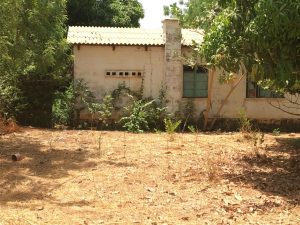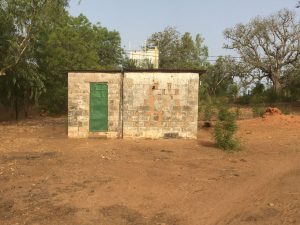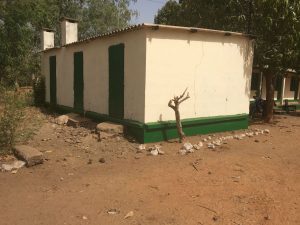This project is made possible through the partnership of WATER CHARITY and the NATIONAL PEACE CORPS ASSOCIATION. ![]()
This project has been completed. To read about the conclusion, CLICK HERE.
 The sixth training of our Permagarden Training Initiative – Worldwide will take place in May 2018. Peter Jensen will train Peace Corps Volunteers and staff in The Gambia with his Terra Firma Permagardens for Empowerment and Resilience course. Here is an outline of what will be accomplished in the training.
The sixth training of our Permagarden Training Initiative – Worldwide will take place in May 2018. Peter Jensen will train Peace Corps Volunteers and staff in The Gambia with his Terra Firma Permagardens for Empowerment and Resilience course. Here is an outline of what will be accomplished in the training.
What:
To provide a complete, hands-on, Four Day Terra Firma Permagarden Creation and Outreach Training
Trainer:
Peter Jensen, RPCV (Haiti, 1985-87), Agroecology and Permagarden Training Specialist
Host and Local Direction:
Peace Corps Agriculture Program Director, Saikou Njai and GambiaRising Executive Director, Mike McConnell
Where:
Jenoi Farmer Training Center, Jenoi, The Gambia
 When:
When:
May 21-25, 2018
Who:
10 Peace Corps Volunteers, their local counterparts, and 10 community outreach volunteers of GambiaRising. 2- 3 Peace Corps Gambia staff may come for professional development and continuing workshop facilitation training.
Summary:
The step by step Terra Firma Method will be used throughout to guide learners and future trainers on how to make the most suitable all-organic, water-conserving, nutrition-focused, home garden for this particular climate and culture.
Terra Firma guides the learner to make the most informed agroecological-appropriate garden but can also be used intersectoral in public health, youth development, and small enterprise development situations as well.
 All actions within the workshop will foster independence rather than dependence upon outsiders to continue. The Terra Firma method uses only the tools, plants and soil amendments that are already locally accessible to targeted beneficiaries, namely rural poor farmers, mothers, and children, enabling further adoption within the local community following training by these soon to be trainers.
All actions within the workshop will foster independence rather than dependence upon outsiders to continue. The Terra Firma method uses only the tools, plants and soil amendments that are already locally accessible to targeted beneficiaries, namely rural poor farmers, mothers, and children, enabling further adoption within the local community following training by these soon to be trainers.
Follow-up within 3 months of training (in coordination with Peace Corps and the Gambia Rising local staff) will be reported to show onward adoption of this simple yet empowering methodology. 60 home gardens are anticipated within this first period, benefiting 7 people per garden, for an expected total of over 400 persons. A full year later this figure will be expected to be near 200, resulting in outreach to over 1,500.
Conclusion of Permagarden Training – The Gambia
This project has been completed under the direction of Peter Jensen, Agroecology and Permagarden Training Specialist. The training was hosted and locally organized by Mike McConnell, Executive Director of GambiaRising, and Saikou Njai, Peace Corps Agriculture Program Director. To read about the start of the project, CLICK HERE.
Peter reports:
Over the course of 3 intensive days, during Ramadan, 25 individuals were trained on the strategic, agroecological Terra Firma methodology.
Hosted by the staff of the Jenoi Farmer Training Center in Lower River Gambia, 7 Agriculture Program PCVs and their village level counterparts, their Peace Corps Program Manager Saikou Njai, and 8 members of the GambiaRising program actively participated in the creation of a classic Permagarden as well as the new Keyhole method. These individuals are now ready to return to their home communities and establish at least 3 gardens each within the next month in the lead up to the major rainy season here in The Gambia.
The timing of this training was ideal in terms of the climate, for it gives the participants time to return to establish these ‘water tank’ gardens at their own homes. Once these ‘teachable moment’ gardens are in place, neighbors will be able to see the benefits and results of the adaptive structures and well amended subsoil.
Here are the principles taught and practiced:
Feed the Soil: Following the water capture design and garden layout process, all the beds are deeply dug and amended with local carbon waster. This carbon acts as a sponge to hold as much water as possible during the coming rains. Following the double dig, the topsoil of every bed and berm is well amended to increase the topsoil structure and fertility . This step is carried out in between every cropping cycle whereas the complete deep dig, once finished, is never needed again.
Fully Protected: The final step of the process is to sow the seeds and mulch the beds. In this case we used neem tree branches from the area to hold the mango leaf mulch in place during the windy days that usher in the rains. These green neem branches will slowly wither and drop their leaves on the surface. The roof behind is 15 square meters, which means that over the course of the coming 3-month rain season, the 1,000 mm of rain will result in 15,000 liters of water coming off and soaking into the subsoil of the garden created below. This is on top of the 16,000 liters of rain that will fall directly on the garden itself for a total of 31,000 liters.
The ‘water tank’: The finished garden ready for topsoil amending and final planting. This is the image that exemplifies the water tank aspect of the garden which was thrilling to all participants. These berms, swales, holes, pathways and double dug beds are all designed in such a way as to maximize water capture. As a result of this design, subsoil moisture is recharged and will return to the root zone over the first half of the dry season thus eliminating all but minimal hand watering. This is a huge change from the conventional gardening method which requires twice a day watering within weeks of the end of the rains. With this garden, it is often several months later that additional watering is required.
Practice Layout: As a final exercise, the group practiced the assessment and garden design process on an open area of hard ground. This guided activity allowed them to build confidence as well as a garden.
Finished Permagarden: This perspective highlights the ecological aspects of the Permagarden. The deep shade and organic matter of the mango tree are used throughout the teaching of the method. Our goal is to create a similar soil microclimate as we experience under the tree. Since we cannot change the climate above our heads we must focus on the climate below our feet.
Finished Keyhole: This shows what can be done to create a home garden in a small and inaccessible area.
Over the course of the next 2 months, participants will create individual gardens and provide guidance to all those neighbors who express desire to the do the same. This multiplier effect will be monitored by PCVs and GambiaRising.